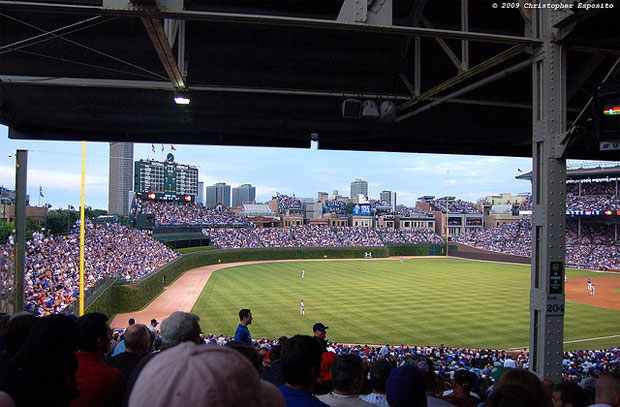Ricketts Asks State For Wrigley Funds
By Benjy Lipsman in News on Nov 12, 2010 4:00PM
Sure, we're still mired in the deepest economic downturn since the Depression. Sure, the state is dealing with record deficits. Sure, the GOP, emboldened by last week's elections, want to cut federal spending and hand off the burden for more government programs to the state. So why not give a few billionaires a huge wad of cash while we're at it, too?
The Ricketts family has asked the state of Illinois to borrow up to $300 million in a bond offering that will fund a major to Wrigley Field, the beloved but 96-year old ballpark of their recently purchased Chicago Cubs.
Cubs Executive Chairman Tom Ricketts justified the request for cash by claiming it would not require new taxes or an increase in existing taxes. Instead, the Cubs would shift money from expected growth in ticket-tax revenue to pay for the stadium. The Cubs currently pay over $16 million to the city and county in the form of an entertainment tax on tickets. The proposal would freeze that payment level and future increases would pay down the debt on the bonds. Left unsaid was where that money is currently going and whether those initiatives would either be sacrificed or taxed more heavily in the future. Both inflation and cuts in funding from higher up the governmental chain mean that current levels of services would be impossible to maintain should the tax revenue not grow incrementally as well in coming decades. Tax money diverted to pay for Wrigley Field is ultimately money that's not funding schools, maintaining parks, paying for street repairs or staffing the police department.
Equally confusing is the Ricketts' "pledge to match the state's investment in the ballpark with their own investments in redeveloping land outside the stadium." Um... why not invest that money directly into upgrading the ballpark? And if down the road it's deemed fiscally feasible, then worry about funding the redevelopment around the park. Makes more sense, no?
While the Ricketts stand to gain a refurbished park for their team, instantly increasing the value of their franchise (look how a new stadium increased George W's net worth), what does the state stand to gain from their partnership with the Cubs owners? The Cubs are no threat to leave Illinois, Chicago or even Wrigleyville. The park is packed virtually every game, and there's not a whole lot of room to increase capacity. In fact, current plans state no increase from the current 41,000 capacity. So a renovation isn't likely to draw that many more fans and their money to the area despite the claims by those in favor of the plan. We certainly agree that the "Friendly Confines" need a good bit of work, but given the financial strain felt by the state, should the government be the ones footing the bill? We just don't believe that many more caps, beer and gourmet sandwiches will get sold to justify the investment -- especially when ticket prices inevitably go up to generate more tax revenue.
But the Ricketts are a smart and financially savvy family. They made their fortune from online brokerage TD Ameritrade. So why not issue corporate bonds and let those who choose to invest take the risk? Or why not spin Wrigley Field into a separate company and take it public, with the IPO proceeds funding the renovations? How many Cubs fans would love to say they own a piece of the historic ballpark? Either way, it's not the Illinois or Chicago tax payers who are on the hook when the numbers don't add up.
